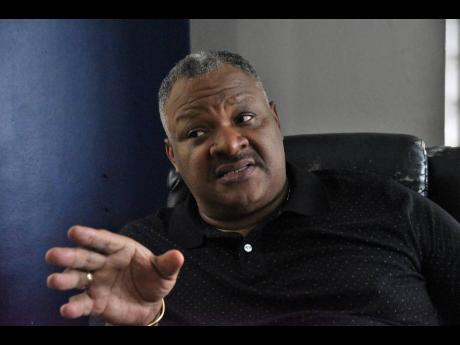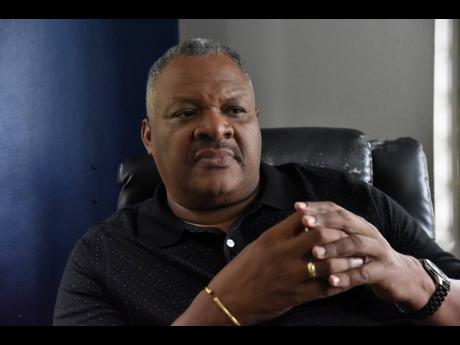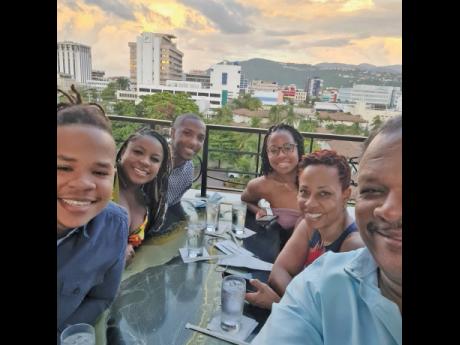Radical system changes essential for a better Jamaica: Danville Walker
Do not be fooled by his loud laughter, for Danville Walker can be deadly serious when he is laughing loudest. The former Jamaica Defence Force soldier does not belabour points, and once convinced on an issue, he does not suffer through deliberations to overturn the obvious.
So when he says “Jamaican journalists do a remarkable job for the resources given to you (including salary)”, he should know, as he was once managing director of the Jamaica Observer newspaper.
A reasonable man, he said journalists in the United States are well paid for the job they do, but they also have team(s) working with them on stories, sometimes for weeks or months. Instead, individual Jamaican journalists were the “team” and had just days, or a day, to produce high-level stories.
Walker did not say what he did to address the situation when he became managing director of the Jamaica Observer in 2012.
But his surprise entry into representational politics in 2011 created a huge buzz and was as electric as it was short. Whispers that he would enter representational politics became reality when he became the Jamaica Labour Party (JLP) candidate in Manchester Central against the incumbent Peter Bunting. His military background made him a standout for the Ministry of National Security, as the party was desperately searching for a new face following the Christopher ‘Dudus’ Coke debacle which ended Prime Minister Bruce Golding’s political career, and sent the JLP packing from office in 2011.
Regarded as a ‘fixer’ in the public sector, Walker was expected to be surgical and practical, but would implement systems to arrest the country’s crime problem.Jamaica’s crime level has been one of the major embarrassments for the country since Independence, simultaneous with the education system, as borne out by the Orlando Patterson 2022 report.
Walker’s various earlier roles have been as former head of Jamaica Customs, director of elections, and head of the Office of National Reconstruction (ONR), which rebuilt houses in Clarendon and Westmoreland after Hurricane Ivan in 2004. But it was Walker’s role in leading the fix of the country’s voting system that was being called his greatest legacy.
He told The Sunday Gleaner fascinating stories about the process of rebuilding, and how he was able to secure the steel needed in the reconstruction process. Another was how political hacks shut down work to build a school fence in east Kingston, and how the tendering process was corrupted, generally, by individuals who do not even bother to change handwriting while sending bids in three different names.
Walker was on duty the night Roy McGann, the late former parliamentary secretary in the Ministry of National Security, was killed on Gordon Town Road in the lead up to the 1980 general elections. He recalled it “being the longest night of his life as a soldier”, as political violence escalated to never-again-seen levels.
But “fix things, then move on” is his mantra.
All eyes were trained on the constituency of Manchester Central in 2011 as the two men, with national profile and supersized egos – Danville Walker and Peter Bunting - electrified the constituency and pulled out more than 20,000 votes between them, when the national average was just over 40 per cent. Walker lost by less than 500 votes, and that was the end of his foray into politics. According to him, the needs of the ordinary man were heartbreaking and he could not fix them all.
He is unlikely to return.
NEW ELECTORAL SYSTEM DID NOT WORK IN 1997
Walker disclosed, for the first time in nearly 30 years, that the now defunct TRW system, which wrote the manuscript for the Jamaican elections at a cost of US$20 million, did not work.
“That system did not work. The young people that work for the Electoral Office at the time rewrote that system. We had an arrangement with Cogent, the company that developed the automated fingerprint identification system, and they allowed us to code around it, and the system that ran the 1997 and 2002 elections is a system that was coded by Jamaicans from them. We took the TRW system, put it in a box and put it in the basement, and never bother to use it again,” he told The Sunday Gleaner.
The entire country revelled in the system believed to have been done by outsiders at the time.
TOP-NOTCH EXECUTIVE NEEDED TO RUN JAMAICA
The executive of each government ministry must be the main driver of policy, he said, but many were being instructed by permanent secretaries, who, hopefully, would not lead them astray.
“It cannot be that the substantive duty of the minister is photo opportunities and reading prepared texts,” he argued.
It is why Walker believes that making Richard Byles the Bank of Jamaica Governor was an excellent move, as well as Dr Nigel Clarke becoming finance minister. The system, he said, should attract the best, and Byles and Clarke were two such. He said he would like to see someone similarly qualified becoming agriculture minister, while making it clear that he has nothing against Pearnel Charles Jr.
Walker wants to see the day when the Jamaica Constabulary Force (JCF) is run by a commission that provides systems similar to services obtained in other countries. He deems it a huge shame when the police have no vehicles to answer citizens’ needs, adding that governments must understand that “there is a cost to running a police force”.
He praised the Independent Commission of Investigations (INDECOM) as “one of the best institutions established in Jamaica in many years”, noting that its purpose was critical.
“I hear a lot of my friends cursing INDECOM. But I said to them, you wouldn’t know. INDECOM needs to be strengthened, but it also needs to look at a much wider vision. It cannot be just about when ‘man shoot man’ kinda thing. It is just too narrow. And there is a popular Jamaican thing, where you make things narrow ‘cause you ‘fraid a things. It must look at more than just fatal shooting, but the management of the police force,” he stated.
Although ballistics machine technology existed for decades, Jamaica only recently received same, he said, adding that “the electoral system could match fingerprints before the police”.
Fingerprint matching was previously done by eyesight.
“We do not treat our citizens well. Have you seen the crowd seeking police records? It’s a shame, and those things bother me. A suh we treat our people? If a man asked why did I go into politics, it was those things that I wanted to change from the inside. There is a journalist in me and it didn’t come from the Observer. It came from living in America and seeing how people of colour were treated as second-class citizens. And one of the things that struck me when I came to Jamaica is how poorly people of colour were treated in their own country. All of the things I used to rail about on my little soapbox in America is because we are black. I came here and found all of them here in a black country, and I had to apologise to America,” Walker said.
POLICE, EDUCATION COMMISSION, AND NOT POLITICAL APPOINTEES NEEDED
Walker said crime was not unfixable, but the approaches taken will not result in the fix we want, stating that “Jamaica does not have a crime problem, but a social development problem that results in crime”.
Education, too, should not be run by a politician.
“I don’t think we should have a minister of education, but a commissioner of education.
Somebody who is competent. Not a former banker whose first days must be spent learning how many schools we have at different levels. And you spend a lot of time learning the problem. We can have an educator, and there is a big difference,” he argued.
Security and education are “complex issues which will take many administrations years to fix. And it certainly will not be fixed by the next election, but that is the approach we are taking”, he noted.
Jamaica’s weakness, he said, was the weight placed on politics in nation-building, as “the first rule of politics is to be elected, and the second rule is to be re-elected, and it influenced governance”. National security and education need persons, or a body, unconcerned with winning elections, he said, stating that “politics has created barriers to new entrants”.
QUALITY OF POLITICIANS, JOURNALISM AND THE CHRISTIE CLAUSE
Walker reiterated a long-held view that Jamaican politicians and public servants were poorly paid. It is his view that salary was a deterrent to recruiting the best persons, and he believes Jamaica gets the politicians it deserves because of the pay, despite the significant improvement over the quality of what existed decades ago.
He expressed disappointment when former Prime Minister PJ Patterson backed off the Values and Attitudes Programme when it was criticised. For him, political capital must be used to do the ‘inconvenient things’ and not held as a badge of honour.
He said former Prime Minister Portia Simpson Miller commanded the largest political capital he has seen. Jamaica “must pay its politicians better, as well as public servants, to attract a better pool of persons in the system,” because “Jamaica needs the best persons at all levels to take it to where it must”, he said.
American journalists, like Jamaicans, make the country strong, but there are operational differences, Walker noted; US journalists are prevented from being sued while investigating an individual, “but that would never happen in Jamaica, as politicians would never allow it”.
He supports the ‘Christie Clause’ in the Integrity Commission Act, saying it was a safeguard to reputations.
“You can’t just run up your mouth and say a man is a thief. You have to have more than that, and because Greg Christie (former contractor general and now CEO at the Integrity Commission) was likely to do more than that, that’s why they came up with that (clause preventing the commission from making public statements on investigations),” Walker reasoned.
Walker said Jamaican politicians were for the most part “bruk” and “don’t have the head space for corruption. When they try it, they get caught. Politicians have their businesses, law practices, one leverages the other, but are not titans of industries to benefit from being in politics”.
He said it will be very difficult to convict a government minister of any wrongdoing, as ministers essentially “give instructions”.
Walker has seen radical political changes in Jamaica, resulting in today’s young persons being loyal only to their phones and social media sites, and having neither the desire nor the stomach for the intense tribalism of their parents and grandparents.
Now a senior vice-president at West Indies Petroleum, Danville Walker cycles for fun (sometimes) and is enjoying his life.



